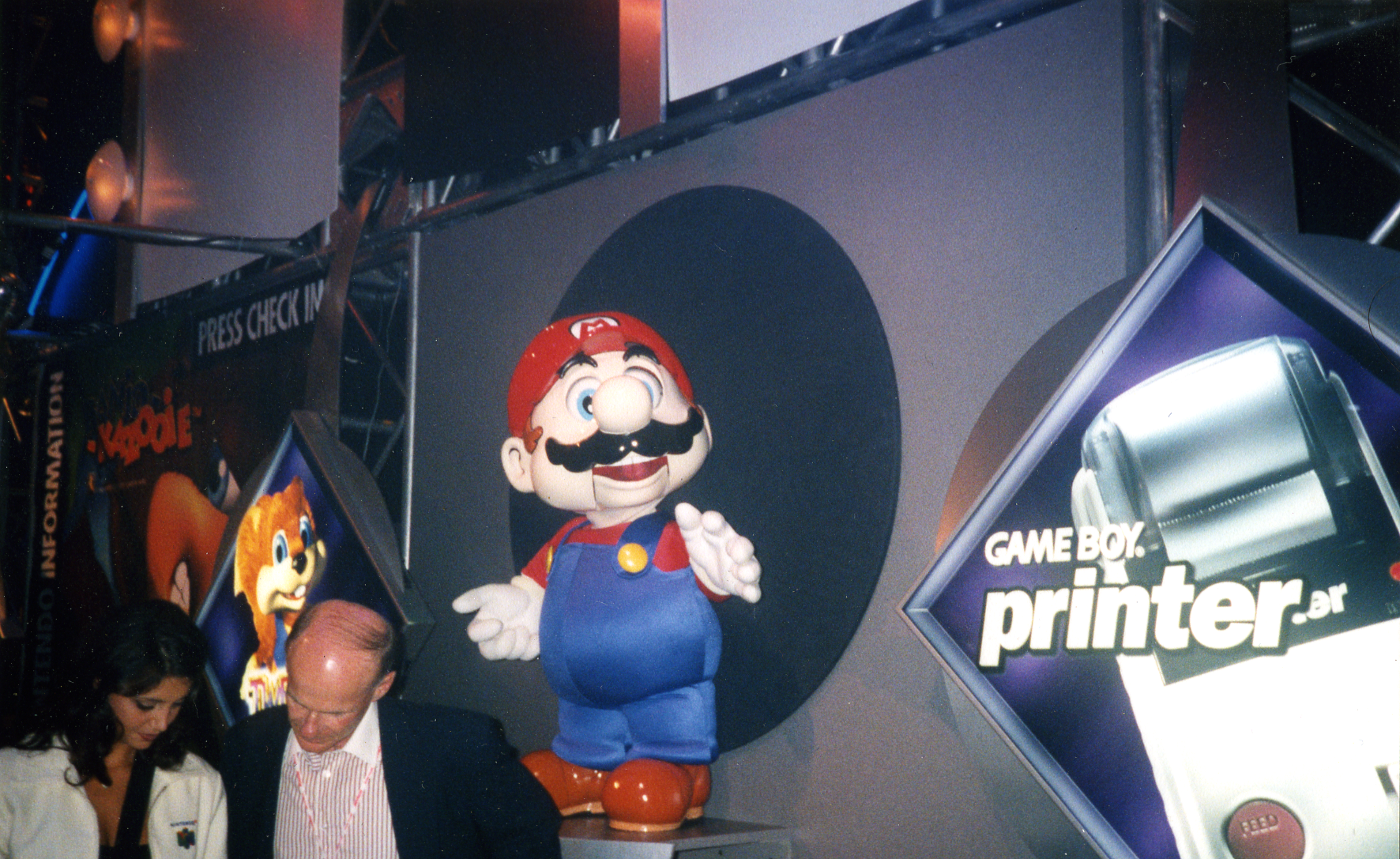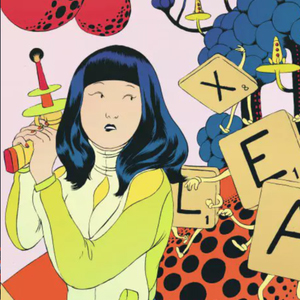Let's look back at the E3 show floor of the '90s and 2000s
Great and terrible E3 moments—and fashion choices—from the last 25 years.

It’s that time of the year when gamers put aside their differences and unite to lovingly roast the equivalent of videogame Christmas: the Electronics Entertainment Expo. Since its inaugural show in 1995, E3 has evolved into a hub for major industry announcements, new hardware and studio showcases, and of course, a bottomless well of memes. There’s always a lead-up of hype and speculation over what’s going to happen each year, which sometimes ends up being all sound and fury.
E3 has had a huge role in shaping the way audiences interact with studios and developers—even Nintendo's popular Nintendo Direct streams were a response to the longstanding influence of E3 press conferences. Today E3 is no longer a business-only trade expo, but an extravagant marketing production that plays to press and fans. Here’s a look back at the highs and lows of the world’s biggest and best-known gaming show.
The 1990s: So it begins
1995: $299
The '90s were a relatively pure, earnest time in E3 history, when it was very much still a trade show that focused on drumming up business. In 1995, Sony’s Steve Race made the historical price announcement for the first PlayStation at the first E3 keynote. He walked up to the podium, simply said "$299," and left.
1995: Virtual flop
Nintendo trotted out the doomed 3D Virtual Boy, which ended up being its worst-selling console (above is a clip of spokesperson Alan Belardinelli talking about it on the showfloor).
1995: You can just... buy a Saturn?
Sega Saturn was a surprise drop, debuting with this incredible video. The Saturn had already been out in Japan for a year and was released stateside to compete with Atari’s Jaguar.
The 1995 show floor
What were some other big names of 1995? Killer Instinct; Mortal Kombat 3; Beavis & Butthead; Cherry Coke. Start the video above for the dance number, and stick around to learn about Williams Entertainment's "Surround 'em strategy."
The 1998 show floor
The following years saw E3 prove that games were an unstoppable force in the electronics world—E3 1997 was marked by FPS classics like Half-Life, Prey, Quake II, and GoldenEye 007. The mid-to-late 1990s gave us Metal Gear Solid and peak old-school Lara Croft with Tomb Raider 2. At E3 1998, the show reportedly sent stretch Hummers to pick up high-profile guests and journalists at the airport. Above is a tour of the 1998 show floor.
Keep up to date with the most important stories and the best deals, as picked by the PC Gamer team.
The 2000s: The edgelord years
2000: Metal Gear? Metal Gear!
E3 2000 kicked off a new decade with a bang. Attendees marveled at the visceral visual details in the Metal Gear Solid 2 demo, which drew excited crowds at the Konami booth (of course, MGS2 showed up again at E3 2001). The 2000 show was all about the PS2 and Xbox; major game announcements included Diablo 2, Neverwinter Nights, and Halo (and a little treasure called Vagrant Story).
The now-defunct publisher Gathering of Developers became infamous for holding a separate side event in a nearby parking lot they called the "Promised Lot." Grit your teeth and read about in this old press release.
Promised Lot antics reportedly included, among other gimmicks, performers with dwarfism dressed as KISS members, ostensibly KISS: Psycho Circus - The Nightmare Child. GoD also had one of the earliest instances of schoolgirl booth babes, an abomination which has thankfully died out (E3 formally banned booth babes in 2006).
2007: The infamous Kennedy show
Even beyond publishers like GoD, the 2000s were a time when E3 decided to start getting edgy. Comedian Jamie Kennedy was invited to host at E3 2007, now rightfully remembered as A Huge Mistake. “This place is the only place that makes the guys at ComicCon look like Ocean’s 13,” slurred Kennedy at the Activision press conference. "Neversoft… wasn’t that the first name for Viagra?" he added. Yes, it all goes downhill from there.
2004: Meet Reggie
On a less cringe note, E3 2004 was also the debut of a now-familiar face: Reggie Fils-Aime, who introduced the beloved Nintendo DS and got the crowd pumped for a new Metroid game (and built-in wi-fi).
2003: Half-Life 2 gets demoed
Gabe Newell announced Half-Life 2 at E3 in 2003 and showed it off to the world. It looked as amazing then as it would a year later. Half-Life 2 was meant to release that September, but had to be delayed to 2004. It showed up at E3 that year, too.
Huge 2006 announcements included the Nintendo Wii and the PS3, and now-cult classics like Bioshock, Gears of War, Mass Effect, and Assassin’s Creed. There was the much-anticipated Halo 3 trailer for the Xbox 360, which went on to sell out the following year. Never forget this moment from Genji: Days of the Blade’s historically accurate giant enemy crabs, or CEO Kaz Hirai’s memed-to-death proclamation of “Ridge Racer!” during the Sony presser.
The 2010s: Awk and awkwarder
2010: Konami does the best press conference ever
2010 started off strong with the sheer absurdity of Konami’s press conference, which nourished the soul of every memelord across the internet. Come for the complete silence accompanying the botched intro, stay for the live luchadors and Naoki Maeda absolutely killing it at the Dance Masters demo.
2011: Mr. Caffeine has a bad time
Not content to let the memory of Jamie Kennedy go unchallenged, Ubisoft’s hype guy Aaron "Mr. Caffeine" Priceman made the studio’s 2011 press conference almost unwatchable. Honestly, this is one of the most painful E3 events etched into our collective memories. "I’m not afraid of a few dick jokes, thank you" is one of dozens of zingers that did not age well (nor did this).
2012: Who remembers Wonderbook?
Blink-and-you’ll-miss-it E3 moments: Sony tried to make Wonderbook, a sort of AR-powered spellbook by J.K Rowling. It was an unmitigated flop. In the vast shadow of the PlayStation 4—priced at $399—Microsoft’s 2013 presentation painted the Xbox One as an over-engineered entertainment device for an exorbitant $499 (boy, do we miss that price today). Remember when folks were feeling pumped about Bioware’s Anthem at E3 2018? Yeah, us too.
Toward the end of the decade, E3 became a noticeably slicker affair that some felt marked the end of an era, and in 2017, it became open to the public. Gone were the days of on-camera goofs, live faux-pas, and technical mistakes—from here on out, E3 was mostly made up of polished, pre-recorded segments. Most notably, 2019 was a shocker for longtime mainstay Sony, which ditched E3 entirely and unveiled news of the PS5 in an interview with Wired.
Games aside, E3 2019 was probably best defined by the massive data leak that compromised the data of over 2000 journalists, financial analysts, and Tencent staff. Yikes.
2020s: Serious business
2020 was an E3-free year thanks to Covid-19. But 2021 is already a new world for gaming as many people have adjusted to a new social and cultural paradigm that almost completely revolves around digital living. Games today are serious business, and E3 has adjusted accordingly, although some have questioned the continued need for E3 as we know it.
E3's pivot to running an all-digital show hasn't been smooth. It's now contending with many competing events, like Geoff Keighley's Summer Game Fest, and it's unclear exactly what benefit the E3 organizing body the ESA has to offer publishers or viewers that they can't get independently.
The expo site for "attendees" has been messy. At first the virtual press portal only allowed “he/him” pronouns. The friend-finding feature apparently let you see other users’ personal information. Impressions of the portal have been so bad that it earned this absolute roast of a review.
Honestly, there’s nowhere to go but up this year. Let the games begin.

Alexis Ong is a freelance culture journalist based in Singapore, mostly focused on games, science fiction, weird tech, and internet culture. For PC Gamer Alexis has flexed her skills in internet archeology by profiling the original streamer and taking us back to 1997's groundbreaking all-women Quake tournament. When she can get away with it she spends her days writing about FMV games and point-and-click adventures, somehow ranking every single Sierra adventure and living to tell the tale.
In past lives Alexis has been a music journalist, a West Hollywood gym owner, and a professional TV watcher. You can find her work on other sites including The Verge, The Washington Post, Eurogamer and Tor.

